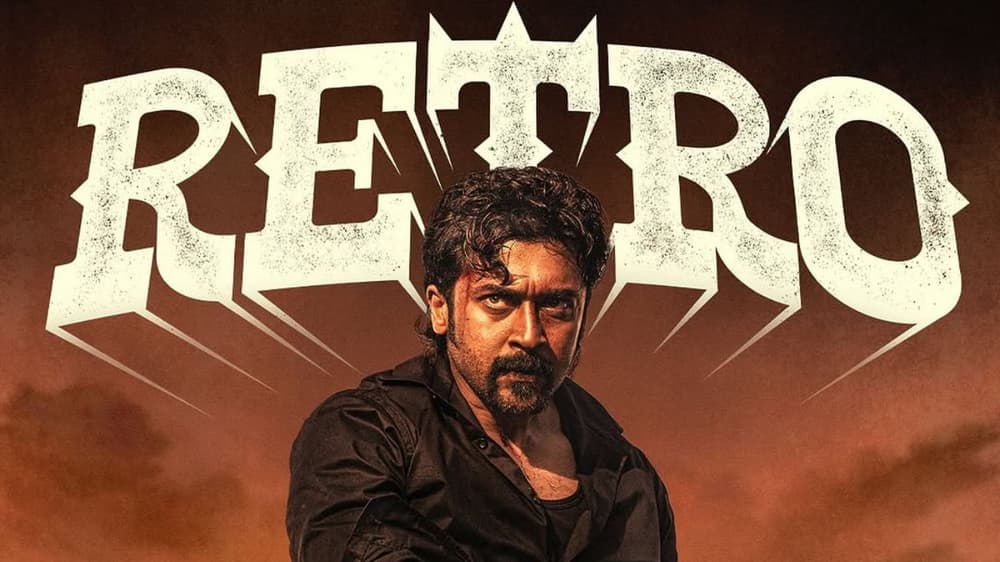Retro (2025) is a Tamil romantic action film starring Suriya and Pooja Hegde. Directed by Karthik Subbaraj, it follows Paari, a reformed gangster on a journey to reclaim lost love and confront his violent past.

Retro is the largest new OTT release to make news in Tamil cinema globally. Starring Suriya and Pooja Hegde, Retro is directed by Karthik Subbaraj and is an action-packed mix of myth, love, and adrenaline-fueled action.
Against the picturesque backdrop, Retro follows the story of Paarivel "Paari" Kannan, a man with a spotty past torn between rebuilding his life through love. Where myth and modernity collide, Retro presents an experience cinema in scale that is emotionally frenetic and visually frenetic—now streaming only on Netflix.
Plot Twist Through Time: The Myth, The Man, and the Memory
In Retro, Suriya plays Paarivel "Paari" Kannan—a hard-boiled orphan brought up in the underworld, meant to live by the sword but desiring peace. Paari falls in love with Rukmini (played by Pooja Hegde), the lovely one.
Paari wishes to renounce his bloodletting ways and marry her. But destiny is different.When a devastating treachery ruptures Rukmini from his clasp, Paari takes a spectral journey through time and remembrance, with echoes of mythos and visions of an radiant sea.
When past and present begin to confound each other, Paari has to deal with the shame of his conscience and the spectres of his decisions—while an ancient legend starts reflecting his own.
Retro borrows from Tamil myths and contemporary revenge and constructs a dreamlike, hyper-emotional tale in which love is manipulated as an instrument, and destiny is far from linear.
First Impressions: A Time Machine Powered by Emotion
The instant it opens, it is such a familiar story—a redemption of the gangster through love. But within minutes, Karthik Subbaraj takes us into a mythic, non-linear world where time dissolves, emotions burst, and visual craftsmanship reigns supreme. The title of the movie is not just a reference to visuals—it's a hint at just how deeply the narrative's tango with the past, both individual and collective, is.
Suriya: The Star Goes On, But a Hero No More
By Paarivel "Paari" Kannan, Suriya delivers one of his richest performances in years. He brings unselfconscious vulnerability to the role that raises him above the action-hero malarkey. Whether sobbing plaintively, fighting irascibly, or reminiscing nostalgically about Rukmini, Suriya takes command of the screen with gravity and dignity.
Pooja Hegde as Rukmini shines, both literally (in dreamlike imagery) and emotionally. She's not just a romantic interest—she's the humanity anchor to Paari, and her chemistry with Suriya injects real warmth into the story's colder motifs of revenge and destiny.
Visuals & Direction: A Cinematic Kaleidoscope
Subbaraj’s direction is a masterclass in genre fusion and visual storytelling. The now-viral 15-minute single-take action sequence is not just technically impressive—it’s emotionally charged, symbolizing Paari’s descent into chaos and control. Meanwhile, the bioluminescent sea fight scene is pure cinema: poetic, surreal, and unforgettable.
Cinematographer Tirru envelops each frame in the manner of an extraterrestrial mural, drenching it with layer upon layer of color, light, and symmetry. Coupled with Santhosh Narayanan's thumping score and jarring background motifs, the film possesses an air that's ageless and über-trendy.
Music: Heartfelt and Narrative-Focused
Title song "Kanimaa", a streaming hit, is not only a pleasant tune but also a rhythm of the narrative. Choreography is a mix of old-fashioned framework and hip futurism, just like the film itself. Santhosh Narayanan's background score complements the emotional weight of each scene, ranging from bruised silences to clap-of-thunder confrontations.
Themes: Myth Meets Modernity
Retro is an issue of radical proportions: Do we get to do it all over again, or are we just actors in a vintage play? The film weaves Tamil mythology and legend together, hypothesizing that the story of Paari can be a retelling of an older, profounder, and uncannily familiar one.
Redemption, karma, lost love, and destiny are all echoing throughout the film. All swords flashed, all tears cried seem to have preceded—and may follow.
The Minor Flaws
The film's impatientness sometimes creates tiny problems of tempo, mostly in the first half. A few of the symbolic scenes are self-indulgent to the audience for a mere action movie. But for those who care about intellectual narration, these side-tracks are all worth it.
Verdict: A Masterpiece Wrapped in Myth
Retro is not a film—it's a state of mind. It's a risk in that it combines folklore and sci-fi backdrop, period romance and cutting-edge ferocity, and raw feeling and high-gloss look. It stands head and shoulders above the rest of this year's new OTT fare as a daring, innovative, and deeply personal film experience.
Be it for Suriya's gripping act, the graphic imagery, or the metaphysical narrative, Retro will make a lasting impression long after the last credit roll.